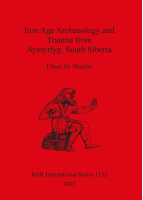Description
BOOK DESCRIPTIONThe objective of this monograph is to elucidate the nature of the health, diet and lifestyles of the two Iron Age populations buried at the cemetery complex of Aymyrlyg, Tuva, south Siberia, through an osteological and palaeopathological examination of their skeletal remains. A multidisciplinary approach was adopted which saw the integration of archaeological, documentary, and environmental evidence with the data derived from the skeletal analysis. During this work a rich array of traumatic lesions were identified among the remains, injuries which shed light on the everyday activities, occupations and warfare practices of the two population groups. The current text provides an in-depth account of the palaeopathological evidence for trauma, while placing it in its archaeological context. Appendix 1 contains data pertaining to the preservation of the remains and the minimum number of bone values that were employed during their examination, while Appendix 2 consists of a gazetteer of the skeletal remains included in the analysis which displayed evidence for trauma. South Siberia and Mongolia are amongst the regions of the Old World with the most ancient traditions of pastoralism. The analysis of the skeletal remains from Aymyrlyg provided a rare opportunityfor the examination of a substantial corpus of skeletal remains of semi-nomadic pastoralists from the vast Eurasian steppe-lands. The research represented one of the first palaeopathological studies of an archaeological population from south Siberia to have been undertaken and, as such, it has made a major contribution to our understanding of life and death in Iron Age Central Asia.











